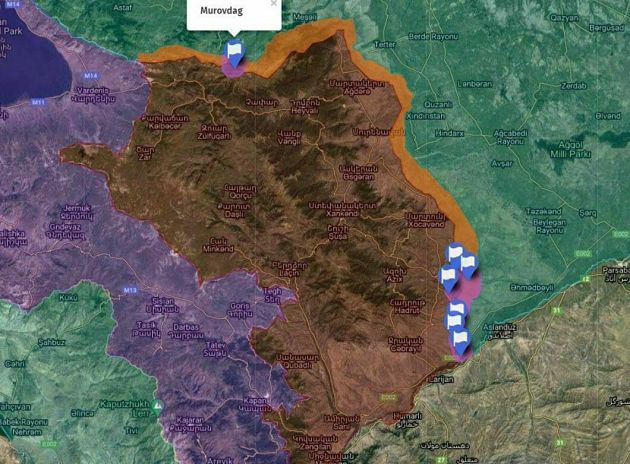Translation: (On the map – territories to be de-occupied by the Azerbaijani army by 28.09.2020)
So, the new-old war in Karabakh has begun. To say that it was sudden would be deceptive – rumors of its imminent start have been widely circulated among the residents of the conflicting states for several weeks, spilling over into the Internet. What is more, its approach was clear to analysts.
For example, in early September we wrote in the article “Sevran fire can burn Armenia” that the actions of the Armenian authorities blatantly provoked not Azerbaijan, but Turkey to a harsh reaction (https://golosislama.com/news.php?id=39128). And more than a month earlier, in late July, Ibrahim Karagul, the editor-in-chief of the pro-government Turkish publication “Yeni Safak,” wrote about the same thing, claiming that in this case Armenia should be perceived as a proxy of the anti-Turkish players in the Great Game (https://golosislama.com/news.php?id=38988).
We will return to the Great Game later, but for now let us remind you of what concerns Azerbaijan, for which after the events of this July the question of the de-occupation of Nagorno-Karabakh and the surrounding territories has turned from a postponed one to the one currently on the table (https://golosislama.com/news.php?id=38948). In an article dedicated to these events we wrote: “… it does not necessarily have to be a one-time full-scale war between two states, which would automatically involve their external patrons in the conflict, something that the provocateurs of this war may hope for. However, the Azerbaijani military and political leadership could learn from the advanced experience of conducting asymmetric military operations of their Turkish brothers, who managed to effectively change the course of hostilities in Libya using the latest military technologies. The Azerbaijani armed forces, acting gradually, could begin to regain control over their internationally recognized territory step by step and force the separatists and occupiers to enter into serious negotiations on the beginning of peaceful reintegration”. And in principle, we are now witnessing the implementation of this strategy, or at least its attempt. The Azerbaijani armed forces, supported by the already legendary Turkish drones, are carving out small pieces of the occupied territories, gradually moving the border between them and the lands controlled by the country.
And now to the Great Game, that is, in the context of foreign policy. Obviously, the continuation of the hostilities in the same way, i.e. on the territory which, according to the international law, belongs to Azerbaijan and will be returned to it, leaves little chance for the Armenian adventurers. Their last hopes are connected only with Russia, but in order to involve it in this war, it will have to go beyond the sovereign territory of Azerbaijan, on which it is currently acting, and escalate it into its own war directly with Armenia, which is a part of the Collective Security Treaty Organization (CSTO) with Russia. However, since the new Armenian government has come to power as a result of a revolution with anti-Russian overtones and has subsequently pursued a policy of turning towards the West, which has irritated both Moscow and the group of pro-Moscow Armenians (Simonyan, Baghdasarov, etc.), several questions arise.
So, first of all, is the Kremlin planning to save this troublesome government or is it aiming to let it lose the war and thus bring loyal forces to power in Yerevan? Second, on the contrary, is Karabakh so valuable to the current pro-Western Armenian group that came to power and ousted the pro-Moscow Karabakh Armenians from there that they are now willing to bow to Moscow and return to its unconditional sphere of influence just for it? Does the current government want to get rid of the Karabakh baggage in order to shift the responsibility for the defeat in the war to Russia and the CSTO, which did not help Armenia at the crucial moment and, thanks to this, raise the question of its accession to NATO?
And this is far from all possible aspects of the Great Game, of which the war between Azerbaijan and Armenia is a part. But it will be time to discuss the others when they become known…

